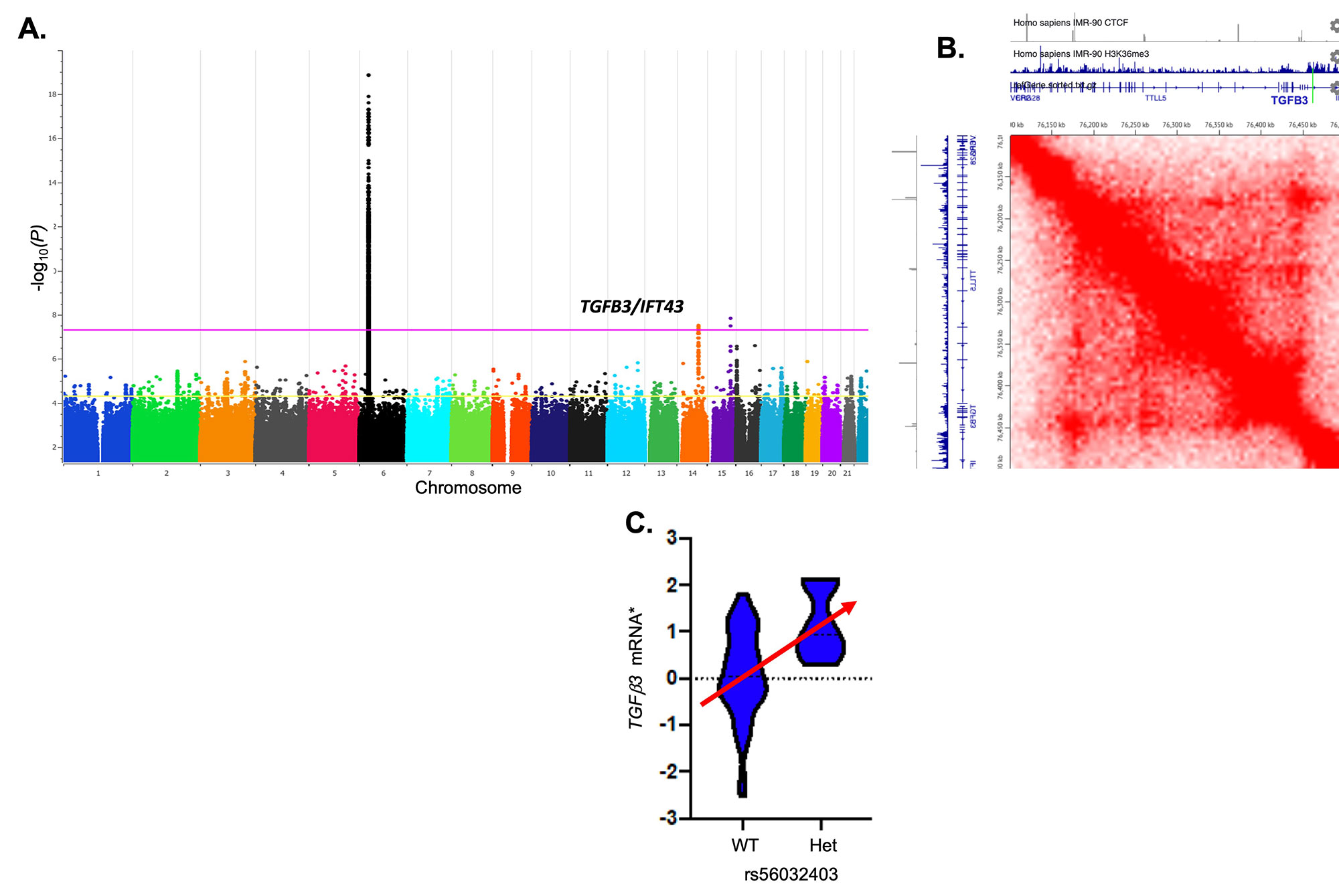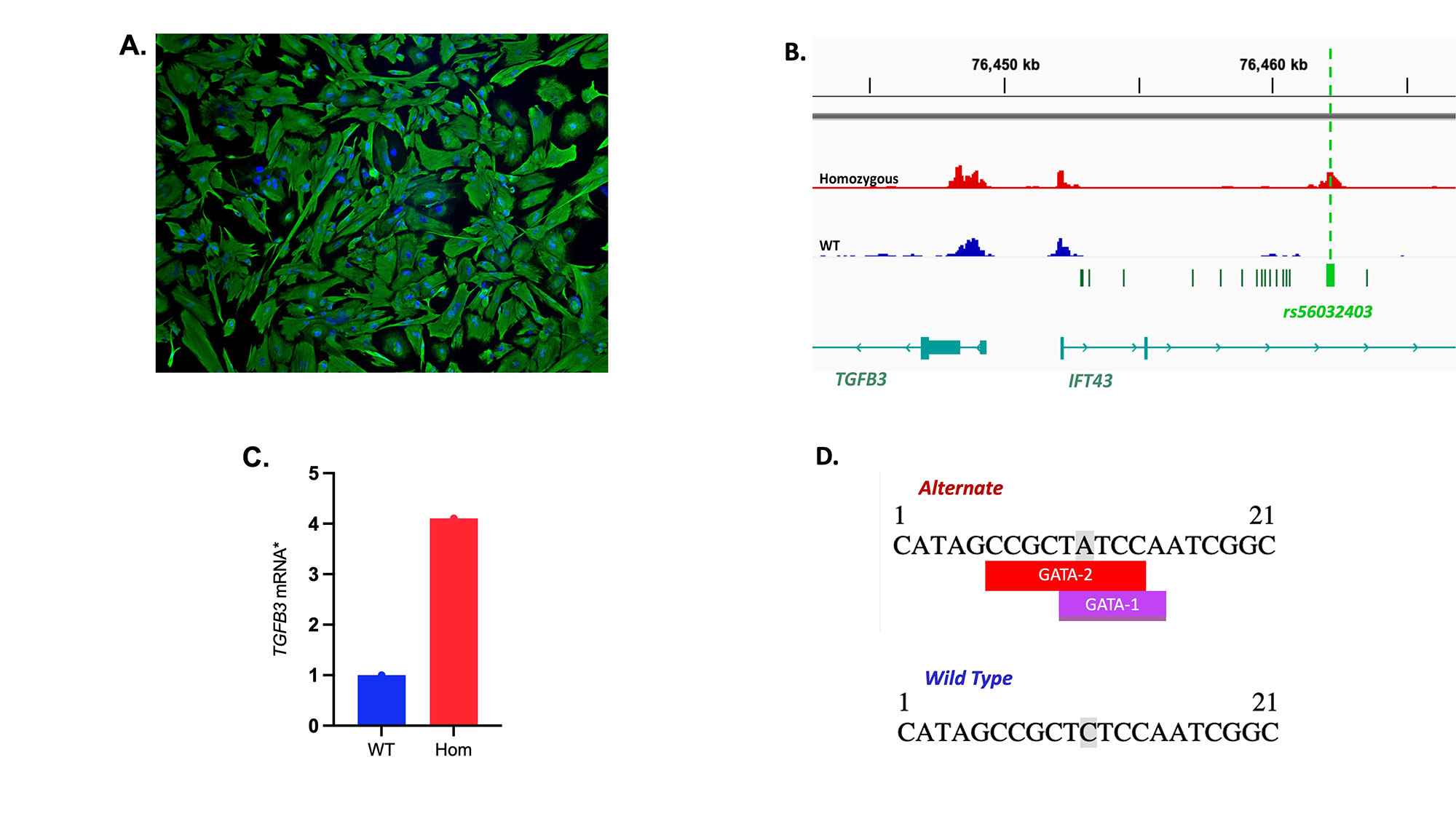Session Information
Date: Sunday, November 13, 2022
Title: Abstracts: Systemic Sclerosis and Related Disorders – Basic Science
Session Type: Abstract Session
Session Time: 5:00PM-6:00PM
Background/Purpose: Transforming Growth Factor-β (TGFβ) isoforms play an important role in extracellular matrix biology. Increased TGFβ-regulated gene signature has been observed in lesional skin and lung tissues from patients with systemic sclerosis (SSc). A genome-wide association study (GWAS) from the Genome Research in African American Scleroderma Patients (GRASP) cohort has identified the top non-HLA locus, that is previously unreported, African ancestry-specific, and downstream of the TGFβ3 gene (Fig. 1A). The objective of this study is to elucidate the functional role of these variants and their role in SSc pathogenesis.
Methods: The Illumina MEGA array was used for genotyping and after quality control filtering, remaining variants were imputed into the 1000 Genome reference panel. Data from ENCODE and Genotype-Tissue Expression (GTEx) were used for Hi-C and expression quantitative trait loci (eQTL) analysis. Lymphoblastoid cell lines (LCLs) from the 1000 Genomes Project that were wildtype (WT) and homozygous (HOM) for the rs56032403 variant were selected and reprogrammed into induced pluripotent stem cells (iPSC). These LCL-iPSC lines were further differentiated into fibroblasts and validated by immunocytochemistry. Assay for transposase-accessible chromatin with high-throughput sequencing (ATAC-seq) was performed to confirm chromatin accessibility at the variant site and RNA-sequencing (RNA-Seq) was performed to analyze expression of TGFβ3. The transcription factor (TF) binding database, PROMO, was used for predicting TF binding. Gene expression data of SSc patients were obtained from GEO databases GSE181549 and GSE58095. Stimulation experiments were performed on normal human dermal fibroblasts (NHDF) using rTGFβ3.
Results: The rs56032403 variant was in the same topologically associated domain (TAD) as TGFβ3 and was an eQTL with TGFβ3 in fibroblasts (Fig. 1B, 1C). LCL-iPSC-derived fibroblasts were confirmed by fibroblast markers- Vimentin, a-SMA, Actin, Hsp47, and S100A4 (Fig. 2A). ATAC-seq highlighted that the chromatin at the site of the variant was accessible in HOM but not in WT samples (Fig. 2B). Higher expression of TGFβ3 was observed in HOM as compared to WT samples by RNA-Seq (Fig. 2C). The TF GATA2, which is expressed in fibroblasts, was predicted to bind to the alternate allele but not to the reference allele (Fig. 2D). Gene expression profiles from multiple published studies have shown increased TGFβ3 expression in the skin of SSc patients (Fig. 3 A-D). TGFb3 stimulation of NHDF resulted in increased expression of SERPINE1, COL1A1, and COMP genes that are increased in fibrosis and are previously reported to be upregulated in SSc (Fig. 3 E-G).
Conclusion: We report a novel, African ancestry-specific, non-coding variant located in the same TAD as TGFβ3 gene and provide evidence for the mechanism by which this variant regulates TGFβ3 expression and is involved in the pathogenesis of SSc. TGFβ3 is expressed in mesenchymal cells and is upregulated in SSc and other fibrotic conditions (i.e., idiopathic pulmonary fibrosis and non-alcoholic steatohepatitis). Targeting the TGFβ3 isoform specifically may be of therapeutic benefit in SSc and other fibrotic conditions.
To cite this abstract in AMA style:
Kaundal U, Hartman J, Stenson E, Safran S, Borden C, Sahu M, Wang J, Conte A, Shah A, Mayes M, Doumatey A, Bentley A, Shriner D, Domsic R, Medsger T, Ramos P, Silver R, Steen V, Varga J, Hsu V, Saketkoo L, Schiopu E, Khanna D, Gordon J, Criswell L, Gladue H, Derk C, Bernstein E, Bridges, Jr. S, Shanmugam V, Chung L, Kafaja S, Jan R, Trojanowski M, Goldberg A, Korman B, Chandrasekharappa S, Zhao Y, Brooks S, Dell'Orso S, Adeyemo A, Rotimi C, Remmers E, Kastner D, Boin F, Casellas R, Wigley F, Gourh P. Genome-wide Association Study in African American Systemic Sclerosis Patients Identifies a Novel Target – Transforming Growth Factor-β3 (TGFβ3) [abstract]. Arthritis Rheumatol. 2022; 74 (suppl 9). https://acrabstracts.org/abstract/genome-wide-association-study-in-african-american-systemic-sclerosis-patients-identifies-a-novel-target-transforming-growth-factor-%ce%b23-tgf%ce%b23/. Accessed .« Back to ACR Convergence 2022
ACR Meeting Abstracts - https://acrabstracts.org/abstract/genome-wide-association-study-in-african-american-systemic-sclerosis-patients-identifies-a-novel-target-transforming-growth-factor-%ce%b23-tgf%ce%b23/



